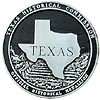| |
|
|
City of Columbus |
|
 |
|
Columbus,
TX,
USA
Latitude & Longitude:
29° 42' 19.36819000008",
-96° 32' 26.80793999988"
|
| |
| |
|
Texas State
Historical Marker |
Oldest surveyed and platted Anglo-American town in Texas. About Christmas, 1821, Robert and Joseph Kuykendall and Daniel Gilleland settled at this place--in vicinity of old Indian campgrounds on Mexico-to-Sabine River Trail. Stephen F. Austin had noted advantages of this spot earlier. In 1823 he and the Baron de Bastrop surveyed land here. Although they relocated the capital, this site remained a hamlet with a grist mill, ferry, other improvements. Soon known as Beason's, community had as settlers, along with the first three men, many others of the Old 300: Abram, John, Rawson, Thomas V., and William Alley; Benjamin Beason, Caleb R. Botick, David Bright, Robert Brotherton, James Cummins, W. B. DeWees, Thomas Kuykendall, James McNair, James Nelson, Gabriel Strawn Snyder; Elizabeth, James, and John Tumlinson; Nathaniel Whiting, and possibly others. In 1824, Milton Cook opened a tavern where many Texans stopped over the years. By 1835, village had been named. In Texas War for Independence, buildings here were burned by the Texas Army, to keep them out of the hands of Santa Anna. But after the victory at San Jacinto on April 21, 1836, Columbus rose again. W. B. DeWees and J. W. E. Wallace platted the new townsite in 1837.
This page last updated: 7/15/2008 |
City of Columbus Historical Marker Location Map, Texas
|
|
|
|


